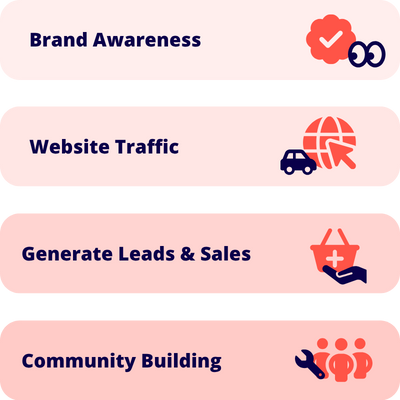No matter the industry you operate in or the size of your business, you need to be on social media to reach your target audience. The best part is that it’s a marketing tool that doesn’t have to break the bank. But choosing the right social platforms for your business can be overwhelming — especially if you aren’t sure which ones align with your business goals.
Here’s everything you need to know to help you understand all the different options and select the platforms that best suit your business.
KYA: Know your audience
The first — and arguably most important — step when choosing social media platforms is understanding your target audience. Knowing who your customers are, where they spend their time online and what type of content they engage with will help you apply the right marketing ideas.
- Demographic: Age, gender, location, and income level can all influence which social platforms your audience uses. Younger audiences, for example, are more likely to use TikTok and Instagram, while older demographics might prefer Facebook.
- Interests and behaviours: Understand what your audience likes, shares, and comments on — this can help you tweak your content to meet their specific interests. Tools like Google Analytics and other social media insights can give you extremely valuable data about your audience’s online habits.
- Pain points and needs/wants: Knowing what your audience is trying to achieve, as well as their wants and needs, can help you create the type of content that will really resonate with them, thereby positioning your business as a solution provider.
Take a closer look at each platform
Every social media platform has its own particular features, which is what attracts different user types. Here’s a quick overview of the biggest platforms out there right now:
- User base: With over 2.9 billion monthly active users, Facebook has a massive user base spread across almost every age group and demographic, which makes it a great platform for businesses that need to target a broad audience.
- Features: Business pages, advertising options, groups, and a marketplace. Facebook’s comprehensive advertising platform means you can do more precise targeting based on demographics, interests and behaviours.
- Best for: Community building, customer engagement and targeted advertising. It’s particularly useful for B2C businesses and local businesses looking to connect with customers in their area.
- User base: Instagram has over 2 billion monthly active users, with a strong presence among younger audiences (i.e. aged 18–34).
- Features: It is a very visual platform, which is perfect if you have a business with visually appealing products and services. Features include posts, stories, reels, shopping and more.
- Best for: Brands that want to take advantage of the visual aspect to tell their story, so fashion, food, travel and lifestyle brands should be here. It’s also effective for influencer marketing and reaching a younger audience.
- User base: LinkedIn has over 1 billion users from over 200 countries. It’s mainly for professionals and businesses and is the go-to platform for B2B marketing, networking, and professional development.
- Features: Business pages, groups, job postings, advertising options, and more. It’s a great place to share industry insights and thought-leadership content and connect with other professionals.
- Best for: B2B companies, professional services and businesses that want to be seen as thought leaders in their sector.
X / Twitter
- User base: X (formerly Twitter) has 368 million monthly active users, and it’s perhaps best known for its simplicity for engaging in real-time conversations and trending topics.
- Features: Tweets, retweets, hashtags, and lists. These are useful for sharing news and updates and engaging in industry-relevant conversations.
- Best for: Businesses that want to engage with customers in real-time discussions, or handle customer service queries and share updates about their company.
Depending on your business type and your target audience, you may also want to consider other platforms like YouTube, TikTok, Pinterest, Reddit, and more. Just don’t try to juggle too much at once — you can’t be all things to all people.

Choosing the right social media platforms also involves aligning your social media strategy with your overall business goals. Below are four common reasons why small business owners might decide to jump online and start their own social media accounts. Maybe you want to:
- Increase brand awareness: If your top goal is to increase brand awareness for your brand, then platforms with larger user bases like Facebook, Instagram and YouTube should be top of your list. You can reach a wider audience with organic content and paid advertising.
- Drive traffic to your website: Platforms like Facebook, Instagram, LinkedIn, and Twitter could be most effective for businesses wanting to drive more traffic to their websites. There are heaps of tools to share links and promote your website content.
- Generate leads and sales: Go for platforms with powerful advertising capabilities like Facebook, Instagram and LinkedIn — these are best for lead generation and sales. You can take advantage of advanced targeting options to help you reach more potential customers (i.e. ones who are most likely to convert).
- Build a community: If you’d prefer to build a community around your brand, Facebook Groups and Instagram are great options. They tend to be better at facilitating direct interactions with your audience and fostering a sense of loyalty.
When deciding which social media platforms to use, there are quite a few factors you’ll need to take into consideration — starting with the type of content you plan on creating. Different platforms are suited to different types of content. Instagram and Pinterest are visual-centric, ideal for businesses that can create compelling imagery and videos. LinkedIn is better for professional, text-based content like articles and case studies.
Resource allocation is equally important. Managing multiple social media platforms requires plenty of time and resources, so it’s better to focus on a few platforms and do them well rather than spreading yourself too thin.
Finally, make sure you choose platforms that have best-in-class analytics tools to track your performance and measure ROI. Taking the time to determine what works and what doesn’t will help you refine your strategy and get better results.
Picking the best social media platforms for your business can help you maximise your online presence and achieve your marketing goals. Now that you know what some of the biggest platforms can offer you, it’s time to strategize for the future and get started with creating content.
Remember, ‘success’ isn’t just about choosing the right platforms but also about being consistent in posting valuable content that resonates with your audience.


























